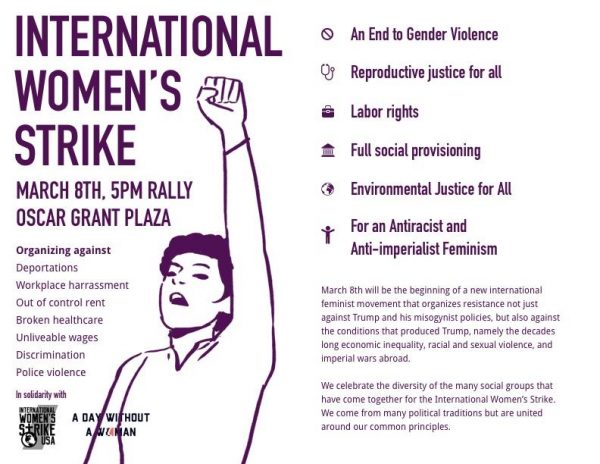Broadway & 14th St
Oakland, CA 94612
USA
The idea for the women’s strike actually didn’t originate in the United States, but it is a call in solidarity with women’s organizations from 30 different countries who put out a call for a strike on International Women’s Day, March 8. This is our effort at trying to explain why it was important that American feminists sign onto this call … in this country, part of our intention is to bring politics back to International Women’s Day by turning it into a political event, by highlighting the ways that women continue to suffer from misogyny and sexism in the United States and to give concrete descriptions of that.
But also, the strike is about highlighting the ways that “women’s work” or “women’s labor” is at times unseen. It can be undervalued, underpaid. The strike is about drawing attention to that by, in effect, extracting those many different manifestations of women’s labor on March 8 to highlight the extent to which women’s labor continues to play a central role in the political and, I would say, social economy of the United States…
International Women’s Day came out of a demonstration of working class and poor women in Petrograd in Russia in 1917 in opposition to World War I and to fight the redirection of resources out of war back into the lives of regular people. The slogan was, “Demonstration for Peace and Bread.”
We are a growing group that is interested in building collective power among women and their comrades. We reject Trump’s racist and sexist basis of power, and the entrenchment of these power asymmetries by capitalism. These forms of women’s domination, and oppression centered on gender more broadly, are not merely a women’s issue. So, unless otherwise noted, our meetings and events are open to all.
_ the plan _
We are starting this process by building towards an action on March 8th, women’s day, in Oakland. This modest goal will help us lay the groundwork for a women’s bloc on the May 1st general strike. The general strike has been called by SEIU, a labor organization that represents mostly service workers–a line of work that mostly employs women and people of color.
_ a word on “women” _
We recognize that the identity of women is fraught. Gender and sexuality are truly fluid historical constructions. These historical constructions form the basis of oppression along the lines of sexuality and become felt in everyday life. This means that oppressive regimes of sex and gender are not issues reserved only for women. Gender and the domination that follows it are a truly human issue, one which men too are not exempt. It is for this reason that we also stand in solidarity with the trans and queer movements, as they are also grappling with these facts of domination.

